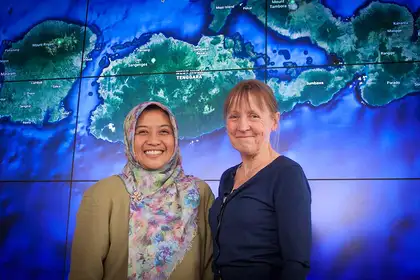
Leaving her husband and family in Indonesia wasn’t easy for PhD student Yulfia Yanuartati, but she had her sights set on helping improve rural livelihoods in her home nation.
“I have been doing rural development research and activities for over 10 years of my career,” Mrs Yanuartati says. “I would like to provide better understanding of rural livelihoods for the development projects so that the projects can achieve their goals effectively, especially, to bring better changes for rural people’s lives.”
After hearing about Massey University from seniors at the University of Mataram, where she is a researcher and lecturer, Mrs Yanuartati decided to make the move.
“I heard from them that Massey is one of the best agricultural universities in the world and New Zealand is a ‘heaven’ on the earth. I also heard that Massey and the University of Mataram were going to have a joined project under the NZ Aid funding.”
Mrs Yanuartati applied for an NZ Aid Scholarship which she was awarded in 2015, after Massey’s Dr Janet Reid agreed to supervise her PhD study.
The project, the East Indonesia Innovative Farm Systems and Capability for Agribusiness Activity (IFSCA), is a four-year, $4.2 million agricultural development project awarded to Massey University by the Ministry of Foreign Affairs and Trade, in partnership with the University of Mataram in Indonesia. It aims to increase the capability of corn and cattle farmers in Dompu on the island of Sumbawa, and with growers of fresh fruit and vegetables in North Lombok on the island of Lombok.
Mrs Yanuartati’s PhD research involved working with field officers, government officers and students to interview cattle farmers in the Dompu district to understand various aspects of their lives and work. This involved trips back to Indonesia to collect data, interpret language and conduct interviews.
"I was able to provide information about the nature of complexity of rural livelihoods, how rural people use their assets for their mix strategies,” Mrs Yanuartati says. “I was also able to provide understandings about the importance of social cultural aspects [traditions, norms, gender, etcetera] that influence farmers’ responses to external interventions, like rural development interventions. This allows further work to be more careful when designing their activities, to ensure the effective achievement of the interventions.
“I am very happy that my research is useful and can be used directly to inform a rural development project. I have gained knowledge, skills, and confidence in doing this type of project because I know that my study is crucial in the implementations of rural development programmes.”
Student life
With her husband and children still in Indonesia, Mrs Yanuartati was distressed by the two large earthquakes earlier this year.
“Both of my supervisors, especially Janet Reid my main supervisor, care about my study and my personal life. She encouraged me to visit my family who experienced very bad earthquakes in Lombok Island this year.”
She says this support was a general theme across the University, arranging regular meetings with other PhD students to discuss research and study, as well as staying connected to a local Indonesian community in Palmerston North.
At a recent symposium held by the School of Agriculture and Environment, where students presented about their research, Mrs Yanuartati won the People's Choice Award.
But she admits there have been challenges.
“I am not confident with the quality of my written English while I am doing social qualitative-type of study, which mainly relies on the strength in written English. To overcome this, I use any available facilities to help me. My supervisor also helped me to find the best people who can assist me in writing. Not only to provide a good quality of writing but also to improve my skills.
“For study purposes, Massey provides the students with many support services. The writing assistance, writing boot camp, trainings, workshops, symposium, and other support services have been invaluable.”